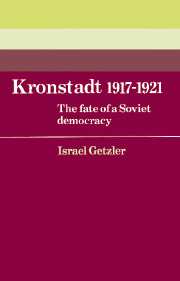Book contents
3 - The Kronstadt Republic
Published online by Cambridge University Press: 29 September 2009
Summary
With the formation on 5 May of the first coalition government, ‘reinforced’ by six representatives of the ‘revolutionary democracy’, to guarantee its ‘fullness of power’, Commissar Victor Pepeliaev may have regarded the time ripe to strengthen both his own feeble and largely decorative authority and that of the new government.
His opportunity came when the Kronstadt Soviet, as was its wont, confirmed the appointment, as chief of the Kronstadt militia, of H. I. Orvid who assumed his duties on 13 May with the blessings of the municipal Duma. Pepeliaev had thus been completely ignored in an appointment that he may have had some reason to regard as within his purview. He may also have resented the Kronstadt Soviet's 12 May decision to tighten its control over the town commandant by flanking him with a permanent representative of the Soviet equipped with ‘wide plenary powers’. No longer prepared to acquiesce, Pepeliaev remonstrated with the Soviet's Executive Committee, only to be told, ‘This is what we have decided and we shall act accordingly, and no one can force us to depart from this decision.’ To put Pepeliaev firmly in his place and make sure, once and for all, that there was no doubt that in Kronstadt ‘power is concentrated in one body alone’, on 13 May the Executive Committee resolved, subject to confirmation by the plenary meeting of the Soviet, as a ‘decision of principle’, that:
the sole power in the city of Kronstadt is the Soviet of Workers' and Soldiers' Deputies, which in all matters of state enters into direct contact with the provisional government. […]
- Type
- Chapter
- Information
- Kronstadt 1917–1921The Fate of a Soviet Democracy, pp. 69 - 110Publisher: Cambridge University PressPrint publication year: 1983



